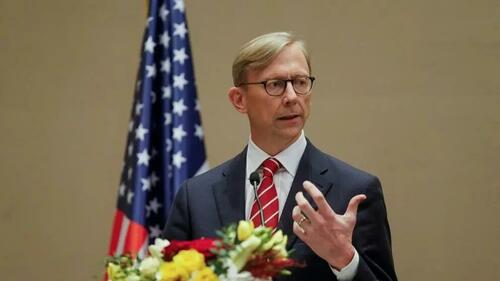A strong indicator of what a second Trump presidency's approach to the Middle East will be has been seen in the appointment of Brian Hook, who was special envoy for Iran in the first Trump administration. Hook is expected to receive a high level national security post this time around, and he previously led the 'maximum pressure' campaign against the Islamic Republic.
It's being widely reported that 'maximum pressure' against Tehran is back on, for example in the Wall Street Journal on Friday: "President-elect Donald Trump plans to drastically increase sanctions on Iran and throttle its oil sales as part of an aggressive strategy to undercut Tehran’s support of violent Mideast proxies and its nuclear program, according to people briefed on his early plans."
"I think you are going to see the sanctions go back on, you are going to see much more, both diplomatically and financially, they are trying to isolate Iran," a former White House official was quoted in the report as saying. "I think the perception is that Iran is definitely in a position of weakness right now, and now is an opportunity to exploit that weakness."

Also likely to inform Trump's policy are the reports claiming that agents of Iran are trying to assassinate him. While there have been propaganda videos coming out of Tehran suggesting such, it remains that there's no publicly disclosed proof or smoking gun evidence of any active plotting in place. However, top officials of President Biden's intelligence community say that there is evidence, and earlier this fall briefed Trump and his team.
Mick Mulroy, a top defense official within the first Trump administration observed that "People tend to take that stuff personally." He added that "If he’s going to be hawkish on any particular country, designated major adversaries, it’s Iran."
As for Brian Hook, he recently told CNN that measures will be taken to further "isolate Iran diplomatically and weaken them economically" to prevent it from supporting regional proxies such as Hezbollah, Hamas, or the Houthis.
"It’s going to be maximum pressure 2.0," Robert McNally, a former US energy official, is also predicting. This will likely involve seeking to disrupt sales to China, which remains Iran's largest oil purchaser, through bans on Chinese ports receiving the shipments. But enforcing this will present another problem.
In prior years the US has been known to attempt direct naval intercepts of tankers carrying Iranian oil en route to places like sanctioned-starved Syria. And the reality is that even during the last four years of Biden, Tehran has remained highly isolated internationally, and with industries like aviation and auto devastated by sanctions already long in place.
Of course, currently there is also the backdrop of potential war between Iran and Israel looming, though for now both sides have appeared to back off following each's tit-for-tat recent strikes. Trump is expected to take the US in an even more hawkish direction concerning defense and aid given to America's 'number one Mideast partner'. Part of this is also likely to include cementing Saudi Arabia's entry into the Abraham Accords, which has clearly and indefinitely been put on hold by the Gaza war.
But there's still a potential Catch-22 which is sure to complicate a max pressure 2.0 campaign. A new op-ed in Foreign Policy lays it out as follows:
There are still comprehensive sanctions on Iran, but the Biden administration has tended to look the other way at Iran’s oil sales. That had everything to do with the political calculations of a president who was stung early on in his administration by high energy prices. The collective pain of Americans at the gas pump contributed to Biden’s persistently low approval rating.
That dilemma will not go away as Trump's team enters the White House and seeks to ratchet Washington's already hawkish anti-Iran policy:
It remains an open question if Trump would risk the same through tougher sanctions enforcement. It depends on how he calculates his parochial interests: Does he want to be the guy who got “the better deal”—consistent with his self-image as master dealmaker—or does he want to ensure that Americans enjoy cheap oil and gas? Does he think he can do both? Only President-elect Trump could know the answers to those questions—and he may not either.
The same author and national security pundit, Steven Cook has highlighted that even during his first term where Iran has heavily targeted, and IRGC Quds Force General Qassem Soleimani was taken out by a US drone, Trump still showed a high degree of pragmatism in backing off at certain key points.
"No interest in regime change..."
Cook writes that "Trump was otherwise quite dovish on Iran. At moments when it would have been legitimate for Trump to use military force—after the IRGC seized oil tankers, mined the Persian Gulf, shot down an American drone operating in international airspace, and bombed Saudi oil facilities—the president chose (with bipartisan support) not to respond."
There's also the question of what Israel's actions will be, given it will likely feel even more of a free reign to respond how it wants to Iran, now with a stauncher supporter in the White House - and with hawks like Hook at the helm of Mideast policy.